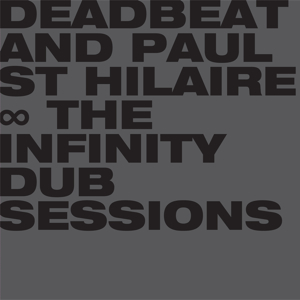Deadbeat and Paul St. Hilaire The Infinity Dub Sessions
Over the past 15 years, Berlin-via-Montreal producer Deadbeat (a.k.a. Scott Monteith) has established himself as […]

Over the past 15 years, Berlin-via-Montreal producer Deadbeat (a.k.a. Scott Monteith) has established himself as a bastion of dub techno, though his more recent efforts have found him tilting more toward techno than dub. In particular, last year’s Infinity Dub single series found Monteith favoring rolling, four-on-the-floor rhythms more than the laidback, half-time rhythms that marked much of his earlier discography. With The Infinity Dub Sessions though, Deadbeat returns more directly to proper dub techno; he’s enlisted the genre’s most quintessential voice in Paul St. Hilaire (a.k.a. Tikiman) and crafted a record that channels the sounds of the Infinity Dub singles through the Rhythm and Sound tradition. The formula may not be new, but The Infinity Dub Sessions does seem to prove that there is still plenty of fruitful terrain to be explored in this underutilized corner of the electronic spectrum.
On his earliest records, especially his exceptional full-lengths for Pole’s now-defunct ~scape label, Deadbeat was considered to be one of foremost artists carrying the minimal dub torch first lit by Basic Channel and Rhythm and Sound. On paper then, The Infinity Dub Sessions may sound like a risky composition, as the LP not only enlists Rhythm and Sound’s most notable vocal collaborator in St. Hilaire, but in many ways, it also finds Deadbeat revisiting his production roots. However, when listening to the album, nothing about the music sounds overly derivative or excessively steeped in nostalgia for dub techno’s salad days. In truth, The Infinity Dub Sessions comes across more like a new chapter in the genre’s story, which many had likely considered closed already. Yet dub techno really does sound fresh here, especially on songs like “Working Everyday,” “Undercut,” and “Little Darling,” all of which push a shuffling techno undercurrent beneath the layers of dubbed sonics.
It doesn’t hurt that Deadbeat’s extensive experience has made him a master of club music textures. On a purely sonic level, The Infinity Dub Sessions is virtually flawless—the filtered chords are thick but not muddy, the bass is deep but still precise, and the percussion is airy but full of impact. Furthermore, St. Hilaire’s vocals are well placed and haven’t been overproduced whatsoever. On songs like the organ-fueled “What the Heck Them Expect” and hypnotic closer “Peace & Love,” Hilaire even takes the lead. For the rest of the LP though, his raspy vocal layers are used as simply another texture in Deadbeat’s arsenal, appearing in pockets before disappearing back into the lush sonic landscape once a chugging rhythm or new progression takes over. This may help the record appeal to those wary of dub’s reggae influence, which has often been taken in a one-dimensional direction by less skillfull producers. Although reggae’s presence is certainly felt here, particularly in terms of the record’s vocal contributions and frequent half-time rhythms, Deadbeat seems intent on making sure that it does not dominate the proceedings.
In terms of its content, The Infinity Dub Sessions offers few surprises. The album is exactly what one would expect—an excellent LP’s worth of dub techno from two of the genre’s most reliable names. With another respectable full-length to add to his discography, Deadbeat continues his run as one of electronic music’s most quietly consistent producers, and though he may not be gaining new fans at a particularly fast rate, he is in no danger of losing any here. The Infinity Dub Sessions is an unassumingly top-shelf record, and really, a perfect soundtrack for being stoned on the dancefloor.

